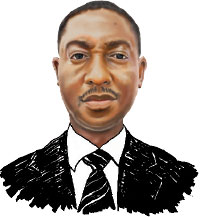By Obo Effanga
0803 324 8854
obo.effanga@gmail.com
www.oboeffanga.blogspot.com
It is the election season in Bayelsa State, #BayelsaDecides, to put it in a funky cyberworld manner. I am actually writing this here in the state where I am one of the domestic observers. Like previous elections I have observed in recent times, the situation on the ground is predictably similar. Tension had built up prior to and even on the day of the election. There is palpable fear of imminent violence across the state. In fact, the official information kit for the election issued by the Resident Electoral Commissioner (REC) in the state, Baritor Kpagih, indicated that six of the eight local government areas of the state were rated high risk and the remaining two rated as medium risk for electoral violence. In effect, there are no ‘low risk’ or ‘no risk’ locations.
And why should election always heighten tension in our country? The answer is myriad, but at the core of it is the fact that being in government has over the years been an easy means to humongous wealth with little scrutiny for the process of such acquisition. Our society in fact promotes such outright economic brigandage when many citizens see the occupation as an entitlement to loot, plunder, control and distribute public resources at the whims of the officers in charge. That explains why our electoral debates are often about which of our various diversity groups the contestants belong to, not necessarily what value they are likely to bring to governance.
I have observed, mainly from the media, what the political campaigns of the major candidates in the Bayelsa elections have been like. I hardly noticed any real issues worthy of getting voters’ appeal. I notice subtle indications of violence, from the description of the main contenders to the symbols of authority or support they were decorated with in different locations. I saw on a few occasions where they received cultural war symbols like swords and machetes. Pray, what are the significances of such to elections?
It is for reason of addressing the security situation that we also witnessed the deployment of a large number of security personnel to the state. That has since become the pattern. In the last few staggered gubernatorial elections we have seen in Ekiti, Osun and Kogi, such deployments have been made. This means that a large number of security personnel have been mobilised from other states to oversee things here. The figure here, as in Kogi, was more than 10,000 policemen/women. But such large movement of personnel also brings with it exceptional circumstances which, from my experience, we have so far failed to appropriately address.
We still see police personnel conveyed in hired commercial trucks and mini-buses from distant places to election locations where scanty or inadequate provisions are made for them. Why, for instance, can we not provide basic lodging and boarding facilities for election duty security personnel? It is usually very degrading to see policemen and women sleep in harsh conditions, even in inclement weather in makeshift places, inside vans and open spaces. Too often, their allowances for such duties are also not provided until well after they return to their bases. Yet, we expect them to be in their best of attitudes on the job. Given that the dates of some of these elections are well known ahead of time, the minimum we can do is to build in the cost while drawing up annual budgets for all the agencies involved in elections.
There is yet another recurring symbol decimal for our elections in Nigeria. That has to do with the lockdown of a state during election. In Kogi, I saw how terrible that affected many travellers who had no business with the elections but just transiting through the state. Could the security agencies begin to fashion out how best movements could be allowed during the election without necessarily compromising the electoral process? This is doable and we should work towards it just as other productive activities could still go on side-by-side elections. I pray to see a future where elections would be just like any other civic duty or process we get into without much tension.







